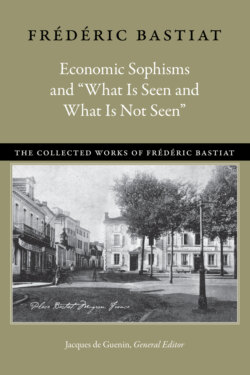Читать книгу Economic Sophisms and “What Is Seen and What Is Not Seen” - Bastiat Frédéric - Страница 11
На сайте Литреса книга снята с продажи.
Оглавление[print edition page xxxi]
Key Terms
In addition to the longer discussion of economic terms in the Note on the Translation, we have added here a list of key terms most frequently encountered in the texts. We have provided a brief explanation of the different contexts in which Bastiat used these terms and how we translated them.
ASSOCIATION, ORGANIZATION. When used with lowercase, Bastiat means any voluntary association which free individuals might create; when used with uppercase (as in Association), he is using the word in its socialist meaning of cooperative living and working arrangements.
CLASSE. The word can be used in a descriptive fashion, as in la classe moyenne (the middle class), but Bastiat usually uses it to describe groups which had some kind of political privilege, such as la classe électorale (the electoral class, i.e., the very small group of taxpayers who were legally allowed to vote and stand for election), or la classe spoliatrice (the plundering class).
DUPE, DUPERIE, RUSE. Bastiat believed that individuals were deprived of their property directly by means of la force (coercion or force) or indirectly by means of la ruse (fraud or trickery) or la duperie (deception). The beneficiaries of this force and fraud used les sophismes (misleading and deceptive arguments) to deceive ordinary people, whom he referred to as les dupes (dupes).
ÉCONOMISTE. The Economists were the group of free-market and free-trade political economists, as in Le Journal des économistes, for which Bastiat wrote.
INDUSTRIE, INDUSTRIEUX. Sometimes used in the modern sense of manufacturing industry but also used to mean any productive activity which produced goods and services for exchange in the free market. Individuals who engaged in these productive activities were called les industrieux.
LAISSEZ-FAIRE. The policy prescription of laissez-faire favored by free-market economists like Bastiat requires no translation. However, Bastiat
[print edition page xxxii]
uses it in a number of ways which require careful translation, such as laissez-les faire (let them do these things), laissez-le entrer (let it freely enter), and laissez-passer (leave them free to move about).
LIBERTÉ, LIBÉRAL. Liberté is usually translated as “liberty” except in cases such as la liberté des échanges (free trade), where the word “free” is more commonly used. Libéral has been translated as “liberal,” with the understanding that it should mean “classical liberal” and not “liberal” in the contemporary American sense of the word.
MONNAIE. The word “money” is used in many senses by Bastiat, such as la numéraire (cash or gold or silver coins), la papier monnaie (paper money or notes), and l’argent (money in a general sense).
PRIX. Bastiat uses many expressions to talk about price, such as le prix d’achat (the purchase price), le prix de vente (the sale price), le prix courant (the market price), le prix de revient (the cost price), le prix rémunérateur (the price which covers one’s costs), le prix débattu (the freely negotiated price), and le prix absolus (nominal or money price).
PROHIBITIONISTE, PROTECTIONNISTE. Les prohibitionistes referred to the advocates of prohibiting imports so that domestic manufacturers had a monopoly of the home market, whereas les protectionnistes referred to the advocates of protectionism who wanted high tariffs in order to help domestic manufacturers compete with foreign manufacturers. The two different systems to which these policies gave rise Bastiat termed le régime prohibitif (the system of import prohibition) and le régime de la protection (the protectionist system) respectively.
RÉGIME. Often translated as “regime,” “society,” or “system,” as in le régime de la protection (the protectionist system) or le régime de la liberté (the system of liberty or a free society).
SPOLIATION. Translated here as “plunder.” There are several related terms, including spolier (to plunder), les spoliateurs (the plunderers), les spoliées (the plundered), la classe spoliatrice (the plundering class), les classes spoliées (the plundered classes), and the adjective spoliatrice (plunderous).
TAXE, TARIF, DROIT. The payments which the government imposed on various goods and services, such as le droit (duty), le tarif (tariff), and la taxe (tax).
TRAVAIL. Many different words are used to translate travail, such as “work,” “labor,” “production,” and “employment.” Related words include le travailleur
[print edition page xxxiii]
(worker or laborer) and la classe des travailleurs (the working or laboring class). Bastiat also carefully distinguished between these two different expressions involving work or labor: le droit au travail (the right to work or the right to a job), which was advocated by the socialists, and le droit du travail (the right to engage in work), which was advocated by the free-market economists.
